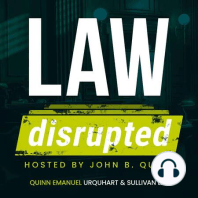41 min listen
Commercializing Universities’ Intellectual Property Portfolios
FromLaw, disrupted
ratings:
Length:
35 minutes
Released:
Oct 27, 2022
Format:
Podcast episode
Description
In this episode of ‘Law, disrupted,’ John is joined by Vinit Nijhawan, Managing Director at MassVentures – a venture capital firm focused on fueling the Massachusetts innovation economy. Vinit also runs the Mass Transfer Center, which helps universities and institutions of higher learning commercialize their unused intellectual property rights.John and Vinit begin by discussing a study that Vinit co-authored that examined how effective or ineffective universities were at commercializing their patent portfolios. One key conclusion of the study was that approximately 60% of the patents held by universities are never licensed. This can send a message to faculty members that the university will not back up their efforts to develop and obtain patents by enforcing them. John and Vinit then examine the best practices at universities that successfully commercialize their patent portfolios. They discuss the entrepreneurial systems at MIT and Stanford, where individual faculty members who develop inventions create a market for their patent either through licensing to an existing company or by creating a startup that venture capitalists invest in. They also discuss universities with activist technology transfer offices that often have funding to help advance projects towards commercialization. These technology transfer offices actively connect faculty members with entrepreneurs and venture capitalists to let them know what technologies the universities have available.The conversation moves on to the steps universities must take to understand which of the 60% of unlicensed patents they should seek to commercialize. Vinit explains that focusing on potential infringement cases helps to identify areas where there is an established market for a given patented technology. John and Vinit discuss in depth how MassVentures helps universities identify areas of their unlicensed patents they should seek to commercialize. Vinit explains that they have used over 200 analysts, primarily engineers, to review patents according to a set scoring system. They go into the elements of this scoring system and how it measures the strength of a patent’s claims, the size of the market opportunity, and how good the story on infringement appears to be. They note that the size of the market opportunity often changes over time and requires periodic re-examination to identify cases where an invention was far ahead of the market when it was first patented. Over time, though, the market may catch up, and a patent that was too early once may become timely and valuable over time.John and Vinit then explore what MassVentures does once it has identified an unlicensed patent that appears to be infringed. Vinit explains that this often involves bringing on board a litigation funder and/or a law firm willing to work on a contingency basis to help make the case for pursuing the infringer. They also discuss the importance of investing in reverse engineering the infringing product before approaching the infringer to be certain that the university has a solid case. John and Vinit explore the reluctance some universities have to initiate patent litigation. They discuss the fear some universities have of adverse publicity and particularly the fear that such publicity would impact public funding. They also examine the impact that having prominent alumni associated with an infringing company or its research grants from that company can have on the decision-making process.John and Vinit then discuss licensing negotiations between the university and the infringer prior to initiating a lawsuit. They compare the relatively low revenues most universities currently receive from licensing efforts with Vinit’s experience at Boston University, which, over five and a half years, launched eight companies that raised over $350m.Finally, John and Vinit explore special purpose entities and their potential in commercializing p
Released:
Oct 27, 2022
Format:
Podcast episode
Titles in the series (100)
Law and the Oscars by Law, disrupted
